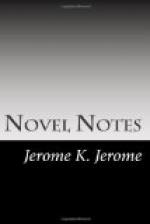“I was shocked at his suggested argument, and walked by his side for a while without speaking. At last, feeling curious on the subject, I asked him how his various love affairs were progressing.
“‘Oh, as usual,’ he replied; ’in and out of a cul de sac. When I am Smythe I love Eliza, and Eliza loathes me. When I am Smith I love Edith, and the mere sight of me makes her shudder. It is as unfortunate for them as for me. I am not saying it boastfully. Heaven knows it is an added draught of misery in my cup; but it is a fact that Eliza is literally pining away for me as Smith, and—as Smith I find it impossible to be even civil to her; while Edith, poor girl, has been foolish enough to set her heart on me as Smythe, and as Smythe she seems to me but the skin of a woman stuffed with the husks of learning, and rags torn from the corpse of wit.’
“I remained absorbed in my own thoughts for some time, and did not come out of them till we were crossing the Minories. Then, the idea suddenly occurring to me, I said:
“’Why don’t you get a new girl altogether? There must be medium girls that both Smith and Smythe could like, and that would put up with both of you.’
“‘No more girls for this child,’ he answered ’they’re more trouble than they’re worth. Those yer want yer carn’t get, and those yer can ’ave, yer don’t want.’
“I started, and looked up at him. He was slouching along with his hands in his pockets, and a vacuous look in his face.
“A sudden repulsion seized me. ‘I must go now,’ I said, stopping. ’I’d no idea I had come so far.’
“He seemed as glad to be rid of me as I to be rid of him. ’Oh, must yer,’ he said, holding out his hand. ‘Well, so long.’
“We shook hands carelessly. He disappeared in the crowd, and that is the last I have ever seen of him.”
* * * * *
“Is that a true story?” asked Jephson.
“Well, I’ve altered the names and dates,” said MacShaughnassy; “but the main facts you can rely upon.”
CHAPTER X
The final question discussed at our last meeting been: What shall our hero be? MacShaughnassy had suggested an author, with a critic for the villain. My idea was a stockbroker, with an undercurrent of romance in his nature. Said Jephson, who has a practical mind: “The question is not what we like, but what the female novel-reader likes.”
“That is so,” agreed MacShaughnassy. “I propose that we collect feminine opinion upon this point. I will write to my aunt and obtain from her the old lady’s view. You,” he said, turning to me, “can put the case to your wife, and get the young lady’s ideal. Let Brown write to his sister at Newnham, and find out whom the intellectual maiden favours, while Jephson can learn from Miss Medbury what is most attractive to the common-sensed girl.”
This plan we had adopted, and the result was now under consideration. MacShaughnassy opened the proceedings by reading his aunt’s letter. Wrote the old lady:




